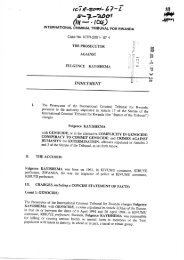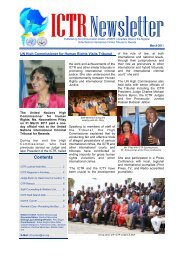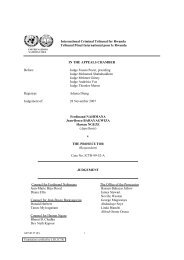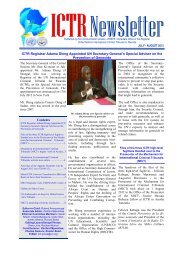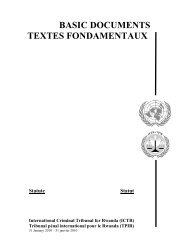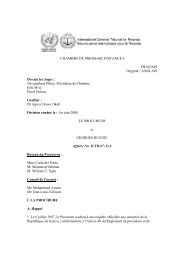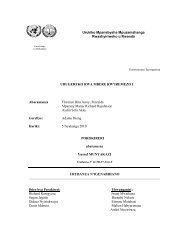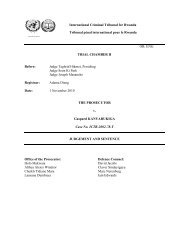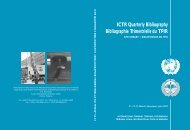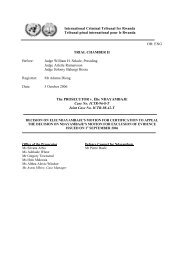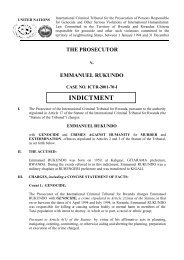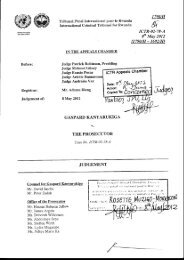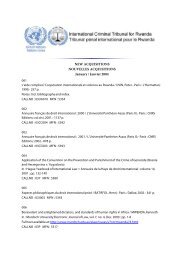Report of Proceedings - International Criminal Tribunal for Rwanda
Report of Proceedings - International Criminal Tribunal for Rwanda
Report of Proceedings - International Criminal Tribunal for Rwanda
You also want an ePaper? Increase the reach of your titles
YUMPU automatically turns print PDFs into web optimized ePapers that Google loves.
various women’s organisations, which are very powerful in <strong>Rwanda</strong>. The nation has the largest<br />
number <strong>of</strong> women in parliament. Although the government could not resist that pressure, it<br />
also understood the merit <strong>of</strong> making rape a Category 1 crime, and so there amendment was<br />
made.<br />
There was an intense discussion on the RPF soldiers and the crimes they are alleged to<br />
have committed the philosophy <strong>of</strong> “victor’s justice” in that situation, and the steps taken by the<br />
military justice system in <strong>Rwanda</strong>. Several panellists also commented on the compromises that<br />
were made in <strong>Rwanda</strong> to stabilise the society and the prominent role that NGOs played in the<br />
aftermath <strong>of</strong> the genocide.<br />
VIII. Concluding Statements <strong>of</strong> the Colloquium by Mr. Hassan Bubacar Jallow<br />
The Mandate <strong>of</strong> the <strong>Tribunal</strong> is to prosecute persons responsible <strong>for</strong> genocide and other<br />
serious violations <strong>of</strong> international humanitarian law committed in the territory <strong>of</strong> <strong>Rwanda</strong>. This<br />
colloquium commemorating the 10 th anniversary <strong>of</strong> the <strong>Tribunal</strong>’s existence provided a <strong>for</strong>um<br />
<strong>for</strong> the exchange <strong>of</strong> ideas and in<strong>for</strong>mation on various issues. It af<strong>for</strong>ded a rare opportunity <strong>for</strong><br />
the ICTR to highlight its achievements and more importantly, learn from its setbacks. This<br />
allowed <strong>for</strong> all institutions present, to develop strategies that would lead to a more effective<br />
and consistent approach in the Prosecution <strong>of</strong> <strong>International</strong> Crimes. All <strong>Tribunal</strong>s have<br />
acknowledged that at their inception they were sailing uncharted waters. The voice <strong>of</strong><br />
international criminal law had not yet been defined. The Colloquium allowed <strong>for</strong> all parties<br />
concerned to redefine, bear witness to and enhance the understanding <strong>of</strong> the international<br />
criminal law.<br />
Mr. Moreno-Ocampo in his keynote address quoted Mr. Nelson Mandela stating:<br />
‘The challenge <strong>for</strong> the modern prosecutor is to become a lawyer <strong>for</strong><br />
the people. It is your duty to build an effective relationship with the<br />
community and to ensure that the rights <strong>of</strong> the victims are protected. It is<br />
your duty to prosecute thoroughly and effectively according to the rule <strong>of</strong><br />
law and to act in a principled way without fear, favour or prejudice. It is<br />
your duty to build a prosecution service that is an effective deterrence to<br />
crime and is known to demonstrate great compassion and sensitivity to<br />
the people it serves.’<br />
The Colloquium af<strong>for</strong>ded the opportunity to expound on how to fulfil this duty and thereby<br />
fully achieved the objectives espoused in its proposal to the donors. Faced with various<br />
constraints and the fulfilment <strong>of</strong> a completion strategy, it was reaffirmed that the <strong>Tribunal</strong>s<br />
must not neglect their duty to the victims. The need to share common experiences, fears and<br />
concerns in accomplishing this tremendous task becomes even more apparent. It is <strong>for</strong> this<br />
reason that Mr. Crane’s invitation to assemble in six months in Freetown, Sierra Leone was<br />
warmly accepted and adopted by the delegates. In addition, Mr. Jallow emphasised the<br />
necessity to network and to create a <strong>for</strong>um where prosecutors can regularly consult each other<br />
in between events such as the Colloquium with a view to continuously improve this<br />
international criminal justice system. Mr. Jallow's proposal to set up a task <strong>for</strong>ce comprising<br />
staff to be identified by each Prosecutor and with the responsibility <strong>of</strong> establishing a best-<br />
33




